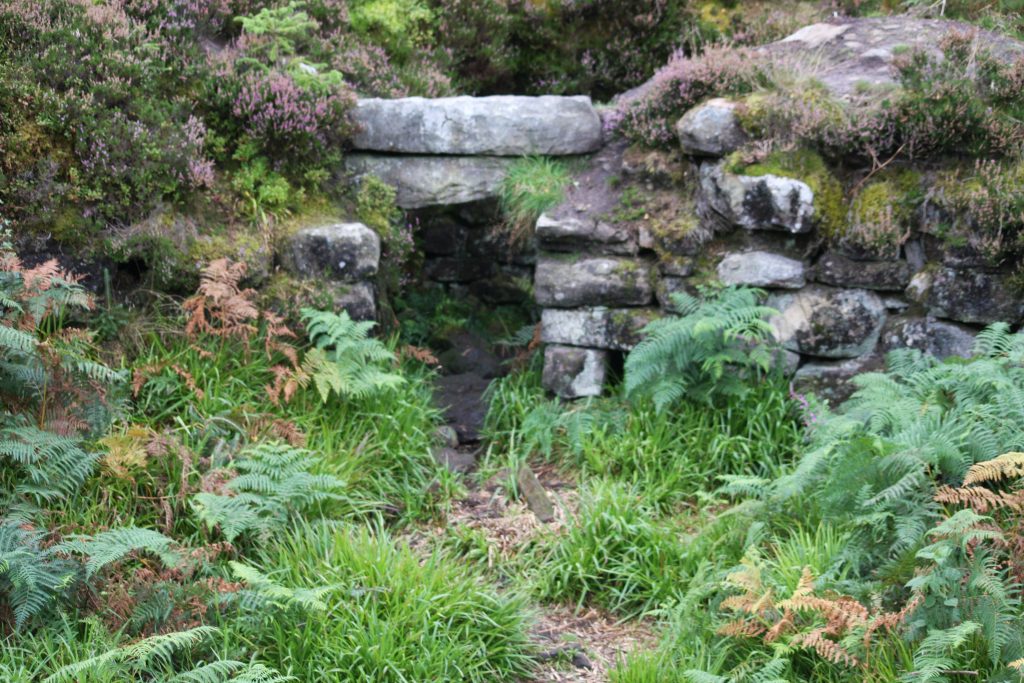
And just like that, it was gone. Once the ivy is in flower, you know, but the signs were all there. All the flowers in the garden are busy setting seed, and the trees are bright with rowan berries, rose-hips, haws. The last field has been cut and all the small birds have disappeared from the garden after the spilled grain. The skies are cloudier, there’s a brisk westerly wind, and the resident geese are grabbing first dibs on all the good places before the northerners arrive next month.
This is Sherriffmuir, where we went to see the heather.

My big ritual for this time is collecting brambles The haggard is full of them, and I took advantage of the good weather last week. The heavy rain and extended dry periods this year meant that many promising shows of blossom never set fruit at all, the earliest ones had gone over already and birds and wasps have been at the ones they missed. But it has been a generous year and there are lots left, shining with ripeness, making it worth the scratches, the torn jeans, the purple splashes from wrist to elbow. The best berries are always further in, higher up or on the most defiant tangles of thorn, and there seems to be an unholy alliance between bramble and nettle. But I hate to miss it.

It’s an autumn experience that is common to a lot of people and most poets have a blackberry picking poem somewhere. I have one myself as part of my Eurydice Rising sequence from Wherever We Live Now. In northern versions of the story, Orpheus gets Eurydice back, so I used both versions to talk about creativity, and mental illness and the kinds of relationships artists develop with their community. In the Breton romance, King Orfeo, Orpheus leaves the court, distraught after the loss of Eurydice, living wild in the forest, in a sort of shamanic disintegration. One day, he sees the fairy hunt passing, and follows.
The next bit is quite significant. He remembers, ‘I used to do that, long ago’. Hunting was a social marker then, restricted to the nobility, and was seen as a useful contribution to the community, culling deer which might have destroyed crops. Orfeo has rediscovered himself, his humanity, and his role in the community. It is only then that he is able to recognise his lost wife Erodys riding among the fairy host, and to follow it back under the grey stone, into the otherworld.
I decided that the role of hunting, especially as it is is practised nowadays, was not one I wanted to endorse, so I chose blackberry picking as an iconic memory, and a prompt to Orpheus’ recovery of human bonding.
Moniage 1: Orpheus in the Wilderness
Orpheus deserts his post. Her flight
is like a magpie raid on his whole life –
what isn’t gone is broken, pulled apart.
Only the harp goes with him, and he plays
in doorways, under arches, in the space
between the human places. When he sings,
the trees bend down to listen. No-one else will.
He is lost without her, and demented,
follows strange girls home, asks who’s hiding her,
shouts obscenities at those who pass him by.
He hears voices in the dark, and follows them
out into wilder places, to be alone.
He comes on children, picking brambles,
noisy, carefree, quick and neat as birds.
They do not notice him, and go their way
unfrightened, and he hears the women call
them home to breakfast. When they are gone,
the silence stirs him like a changing wind.
He says, “I used to do that, long ago.”
He thinks of berries shining, intact, black,
the small hairs tickling his outstretched palm,
the scratches worn like war wounds, and the brag
of secret places, where there’s loads still left.
That’s when the door opens, the shadowed way
beneath the grey rock, to the other place.

This is Tappoch Broch near Torwood, as otherworldly as the central belt can get! (This will be next week’s post.) My bramble-picking only led me as far as blackberry and apple crumble, and very nice it was, too!

